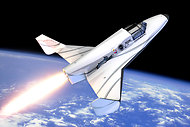So I work each day in technology, helping to create a web site, set up a projector or assist a teacher with a technology driven lesson. But I'm also keenly conscious of this professional world I now inhabit because I came to it later in life and can see it with the fresh eyes of a relative newcomer. Perhaps I'm more easily wowed than someone who has worked in the field for decades because he or she has grown up with the engineering changes.
Take a recent article in the New York Times (9/9/12). The article offered an exhaustive look at the present and future of commercial space travel. Incredibly, to me at least, the article was in the Travel section. Space travel is here, albeit only for the ultra-wealthy.
This article and the idea of space travel provoked an interesting lunch conversation. Money aside, "Would you go or not?" elicited the full range of responses. More interesting was a collective musing over the world we live in where so many live in want, and a few can pay upwards of $100 million for a one-time thrill ride. But all at the table understood that this article represented yet another instance where a technological threshold had been crossed. Much like personal computers, cellular phones, touch screens and voice recognition, every few years we embrace (or grudgingly acknowledge) yet another technological leap forward.
 |
| A rendering of XCOR’s Lynx suborbital vehicle. It would hold a pilot and a passenger. (from the NY Times, 9/7/12) |
But there's a physicalness to this magic, a point thoroughly documented in Andrew Blum's Tubes. Tubes is a book about the internet, but not in the usual abstract way. It is about the physical, concrete internet, the set of optical fibers and routers and servers and switches and tubes that have created a world wide web. It's also the story of how the internet was invented and yes, Al Gore gets his mention. Long ago, in the early 1960's, computer scientists in the forefront of the field explored first creating computer networks and then linking networks together. They were called internetworkers. We have inherited their vision.
As their work progressed, they needed physical places to link networks. And the networks needed physical places to house data. In both instances, warehouse structures with enormous space were utilized for the requisite machinery. And fiber, as well as existing phone lines, was needed to connect locations. In short, an infrastructure was created and it continues to grow exponentially. When today's internet is considered, its physical presence is never mentioned. Yet over the last several decades, an infrastructure has been built that equals, in scope and importance, the national highway system of the 20th century and the railroad lines of the 19th century.
There are risks attendant to this change. The risks can be as personal as cyber-bullying or as mundane as the knowledge that one has spent far too many hours playing video games or web surfing with little to show for it. James Steyer's book, Talking Back to Facebook, vividly points to many of these personal risks and reminds readers that youngsters are most vulnerable.
The risks can occur at an entirely different scale as illustrated in Worm by Mark Bowden. It's a story of our time in which cyber-security experts attempt to secure individual computers and networks from a particularly vicious global computer virus. Here, one learns about how the underworld has seen technological change as an opportunity for profit. The book is a reminder that the computer networks we inhabit connect us in sometimes unexpected and dangerous ways.
And though it's unclear whether or not having your online data mined constitutes a risk or the end result of a commercial enterprise, personal data is being gathered at a furious rate from digital users. This has become the true commercial backbone of the internet and it is frightening to many savvy users. But phone owners, EasyPass subscribers and a great many other consumers in the digital world are ceding their privacy for the advantages of comfort and efficiency.
I've spoken to enough teachers over these few years to know that many feel a bit overwhelmed by the technological change they see. That's not an admission of weakness or a characteristic of old age. Rather, it represents an awareness. If you're not feeling a little overwhelmed, you're not paying attention to the rate and quantity of change. Unless you are a product editor for Wired Magazine, I would argue that it is impossible to fully keep up with the field. But that's no reason to throw up your hands in defeat. I really enjoy college basketball and pay attention as each season unfolds, but there are too many teams and players to stay on top of it all. I don't worry abut that. I find parts of the whole I'm interested in and focus my attention there. Find what works for you and utilize it wisely. The technological world is remarkably interesting and ever-changing. It's worth exploring, but it's important to exercise caution as well. So be curious, but be careful as well.
Interested in follow-up reading?
Space Tourism is Here! Wealthy Adventurers Wanted. McKinley, Jesse. The New York Times. 9/7/2012.
Tubes: A Journey to the Center of the Internet. Blum, Andrew. Ecco. 2012
Talking Back to Facebook: The Common Sense Guide to Raising Kids in the Digital Age. Steyer, James P. Scribner, 2012
Worm: The First Digital World War. Bowden, Mark. Atlantic Monthly Press. 2011.
"Data Snatchers! The Booming Market for Your Online Identity." Sullivan, Mark. PC World. August, 2012
It is true but But that's no reason to throw up your hands in defeat. I really enjoy college basketball and pay attention as each season unfolds, but there are too many teams and players to stay on top of it all. http://it-techpros.com/
ReplyDelete